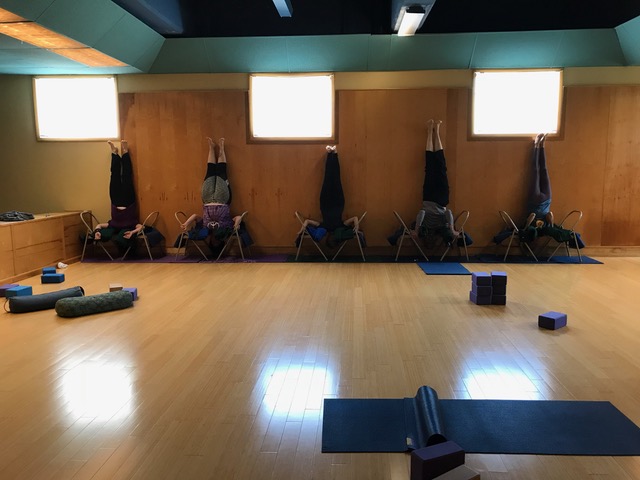Wednesday mornings are a special time at the Milwaukee Yoga Centeron the east side. That’s when a free “Yoga for Veterans” class meets. The class is a personal donation by a Certified Iyengar Yoga teacher whose dad served in the Korean War.
I’m not a veteran, but I’m a long time student at MYC and I convinced my partner, who is, to try the class for a while. I go even when he doesn’t, because the camaraderie and mutual support among the regulars is a wonderful thing.
Because June is PTSD (Post Traumatic Stress Disorder) Awareness Month, I interviewed yoga student Grant Kniedler (a Vietnam vet) about his experiences, PTSD and how yoga and social networks promote healing.
Grant has stories! A native of Pittsburgh, he got into a bit of trouble in 1967. Given a choice between the Marine Corps and jail, he enlisted. He served as a rifleman in the infantry, in areas (Danang, Khe Sanh) that saw fierce fighting. He completed his tour in Vietnam alive, but haunted. For years after the war, Grant kept moving.
If you weren’t a combat infantryman, I didn’t want to talk to you. I’d talk to women. But if you were a man and hadn’t been in combat, I had nothing to say to you.
He crossed the US hitchhiking some fifteen times.
He studied oceanography at the University of Hawaii; studied forestry, then theater at the University of Nevada, in Reno. He had long spells where drinking and drugs made one day run into the next. He met a woman whose husband had committed suicide. They hitchhiked all over South America, with her six-year old daughter. Did a lot of risky things. Risky behavior – that’s a mark of PTSD.
It was a winding road, but Grant eventually took up flooring installation as his trade, and wound up living in the Kickapoo River valley in western Wisconsin. He was married and raising a family but he still felt intense resentment. Alienated from civilian life. He felt that the Vietnamese people would’ve been better off without American presence. He couldn’t forget the day that, of 44 people in his unit, 18 died and 23 were wounded.
After seeking help at the VA in Tomah once, but felt disgusted. He was speaking tosome guy fresh out of college. He remembers feeling that the guy didn’t even deserve to speak to him. Fast forward again…Grant moved to Milwaukee after getting divorced, and went to the Zablocki VA Medical Center for his care. He saw some flyers there that caught his eye – one for a T’ai Chi class, and one called “Warrior Stance”, a yoga class offered there.
I liked the design, and the name – “Warrior Stance” . A woman coping with physical and mental traumas sustained in the Iraq war was in the class too. She told him about the free classes at the Milwaukee Yoga Center and invited him to come. He tried it.
Yoga helped with my posture…when you stand up straight, it influences how you feel about yourself. When you stop slouching, you stop feeling inferior. You feel like you’re capable, that you deserve to take up space.
The vets at Wednesday class take a while to settle down.
There are always hugs and information to exchange first. In class one day, a classmate told Grant about the Milwaukee Art Museum Garden Club. She didn’t just mention it…she invited him to check it out. Grant did, and he can’t say enough about how therapeutic it is to share this interest and be fully accepted in a group where he’s the only single man. Now he’s also part of the Prairie Pals, who are restoring sections of Lakeshore State Park.
At a Season 6 story slam, “Surprise/Sorpresa”, a young woman told a poignant story about growing up with a veteran father who suffered from PTSD. She was a playful girl and it was hard for her to understand his triggers. When she was in her teens, a party she was at with friends was interrupted by gunshots. Someone was hit. After that, she understood why she’d been warned not to jump out of closets and yell surprisearound her Dad. Combat in military service had changed her father. Gun violence in civilian life changed her.
Every day, every type of media brings us stories of all the brutal ways people are being traumatized in military conflicts and civilian life. There’ve been searing stories shared on the Ex Fabula stage. The best way to prevent PTSD is to end war and all forms of violence and abuse; but as we dedicate ourselves to that, it’s also good to focus on healing.
Grant’s story makes me hopeful, because some of the seemingly smallest gestures…the care involved in preparing a flyer…the step of extending an actual invitation instead of just mentioning an activity…the time a teacher takes to prepare a sequence of postures…change lives for the better.






Leave A Comment